Small businesses that rely on specialized talent have long turned to the H-1B visa as the primary route to hire foreign professionals. The new requirement that employers pay a $100,000 fee for many H-1B cases filed after September 21, 2025 has changed that calculation. For large corporations, this new cost may be absorbable but for startups, boutique firms, local clinics, research labs, engineering shops, technology innovators, and other small employers, the fee can make the H-1B category functionally unavailable. Many employers who would ordinarily pursue H-1B sponsorship are now searching for realistic alternatives. This shift does not eliminate the possibility of hiring foreign talent. It does require creative, early planning to determine whether another visa classification aligns with the company’s needs and the candidate’s background. The goal is to match the role, the qualifications, and the business structure to a category that supports employment without triggering the $100,000 H-1B entry fee.
Read moreYear of the Snake
Happy Lunar New Year! As we leave behind the year of the Dragon and head into the year of the Snake, we are enjoying one of our favorite Lunar New Year displays at Atrium at Crown Towers in Melbourne, Australia. Though many think of snakes with negative connotations, Dr. Xuan Wang, a senior lecturer in Chinese studies at Cardiff University, puts us at ease explaining that the Snake is intuitive, mysterious, and very smart. Like all zodiac symbols, the snake is rich with symbolism. Known for shedding their skin, the Snake teaches us to shed off any toxicity and negativity as we head into the new year. Sounds promising!
Hello from Melbourne!


While some members of our team endure the cold winds and snow that have been swirling around our New York office, we are enjoying the January summertime in Australia. Between the summer heat and the excitement of the 2025 Australian Open, Melbourne is, as always, our happy place! In particular, we have been appreciating the views of hot air balloon tours floating over the city at dawn, dotting the skyline with bursts of color. Oh and did we mention the coffee? After too many “magics” we are buzzing over here…
G’day from Sydney
As frigid winds whirl in snowy New York and London remains overcast, we’ve made an escape with the snowbirds to Sydney. Between the summer weather, beautiful landmarks (anyone coming along on the Bridge Climb with us?), and the happy beachgoers, the city is alive with energy to kick off the new year. This view of the Opera House out on the Harbour is one that will never lose its magic, always radiating a welcoming warmth.
"Temple of Boom" by Adam Newman and Kelvin Tsang
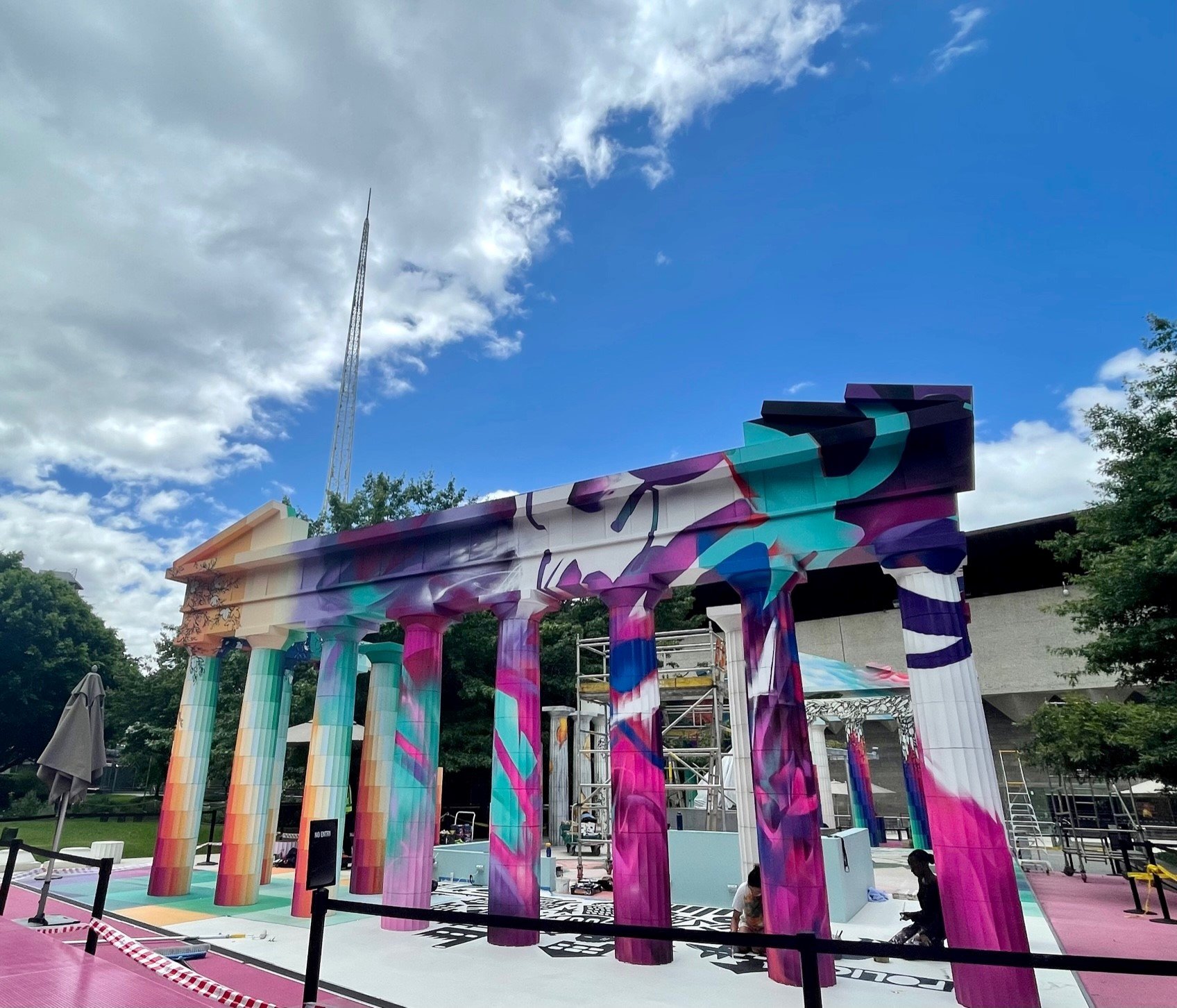
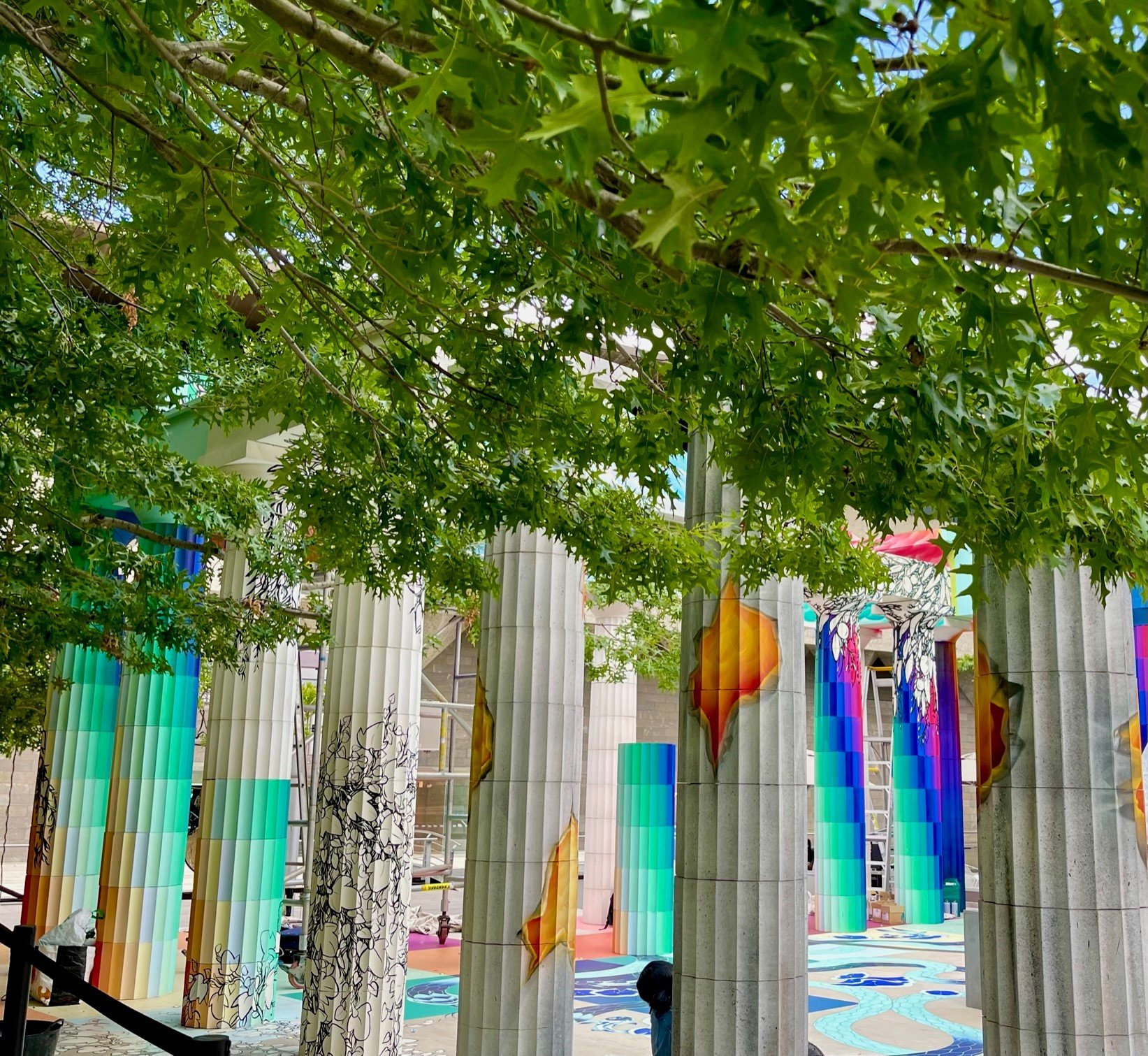
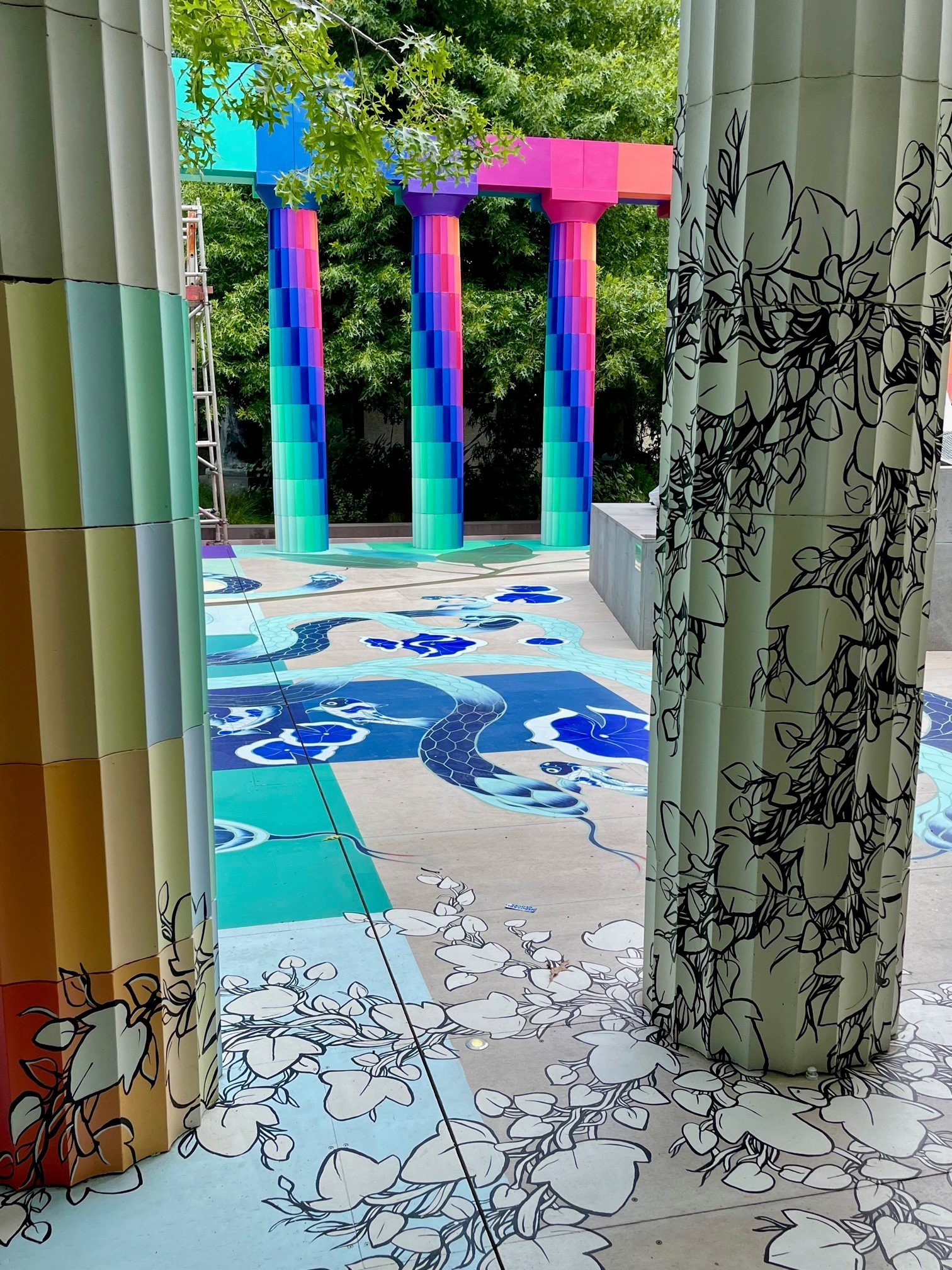
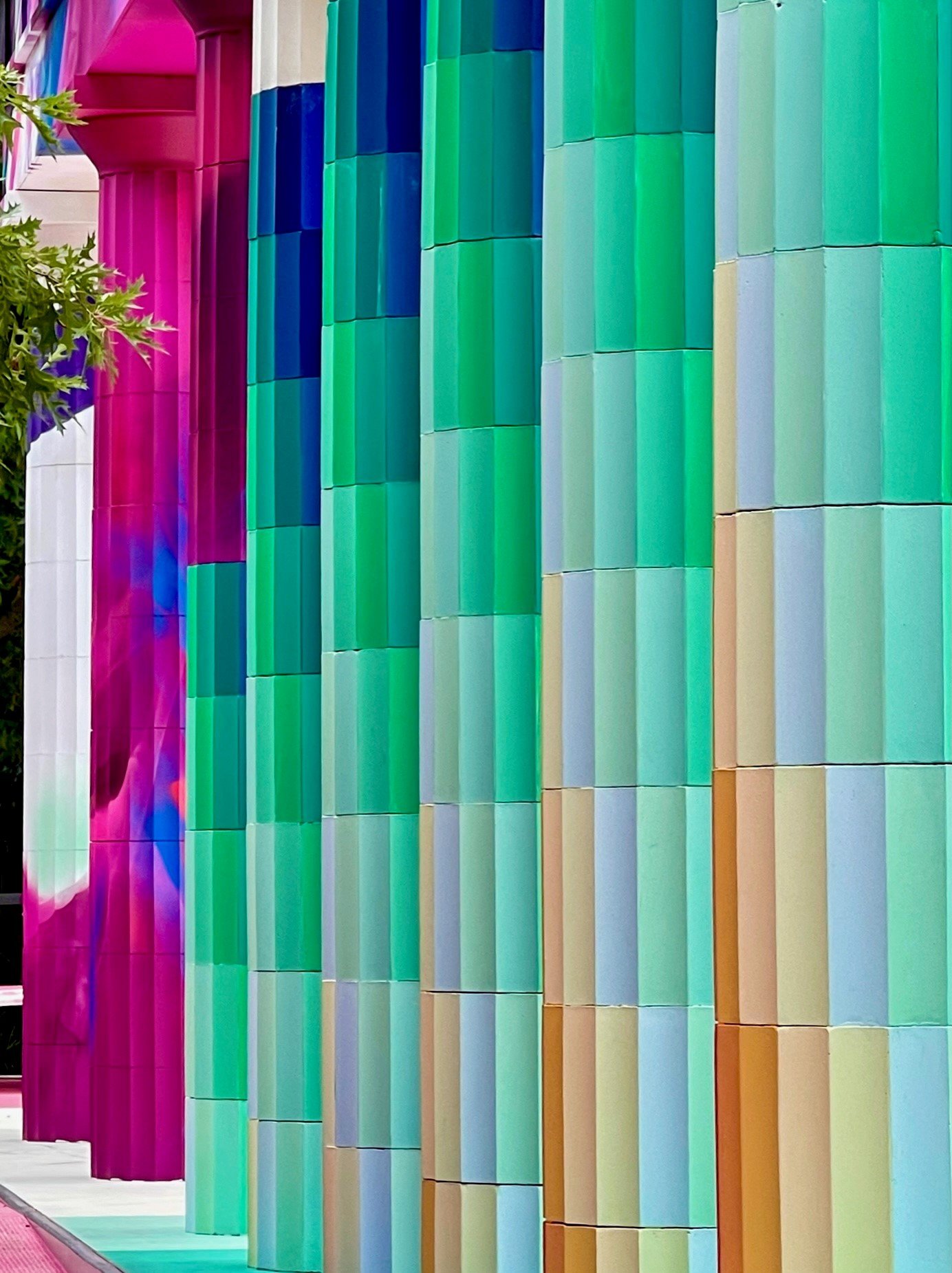
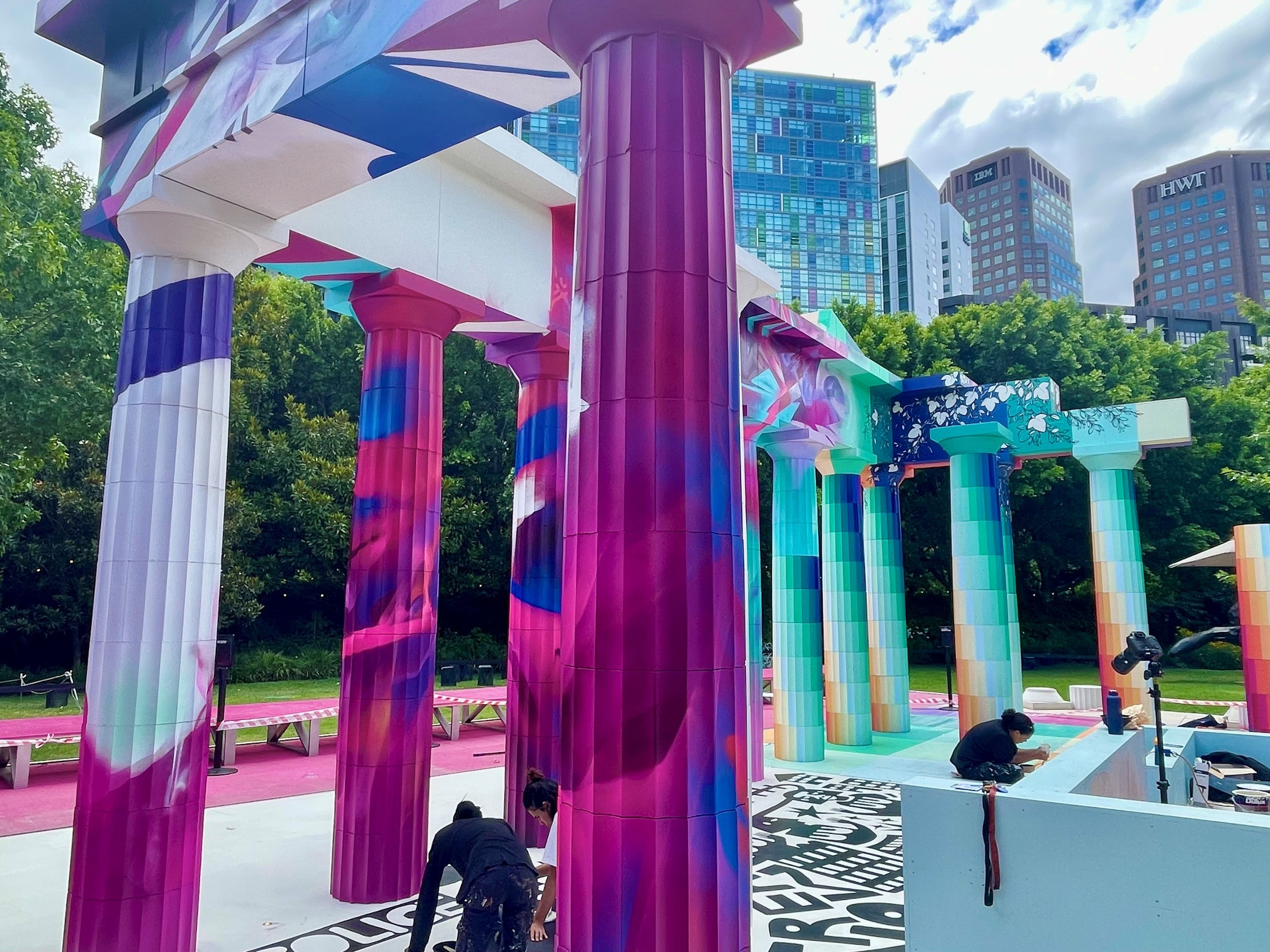
Inside the Grollo Equiset Garden at Melbourne’s National Gallery of Victoria (NGV) sits the “Temple of Boom”, a recreation of and tribute to the Parthenon on the Acropolis in Athens with a modern and whimsical twist. The work created by Australian architects Adam Newman and Kelvin Tsang is part of the NGV’s annual Architecture Commission series, which invites Australian architects to create site-specific work in the gallery’s garden. The eye-catching installation transports audiences back to Ancient Greece while inviting them to consider the effect of time on architecture, as the structure will gradually transform with murals and other artworks from local artists, having started in November 2022 and continuing through August 2023. Built as an homage to the Greek Goddess Athena in the fifth century BCE, the Parthenon has changed use and form over generations, being used as a temple, a church, and a mosque. With the Parthenon once considered an apex symbol of Western civilization, “Temple of Boom” invites viewers to consider physical structural transformations with those societal transformations which exist more in the abstract and posits reimagination and beauty as constants.
“Cow Up a Tree” by John Kelly
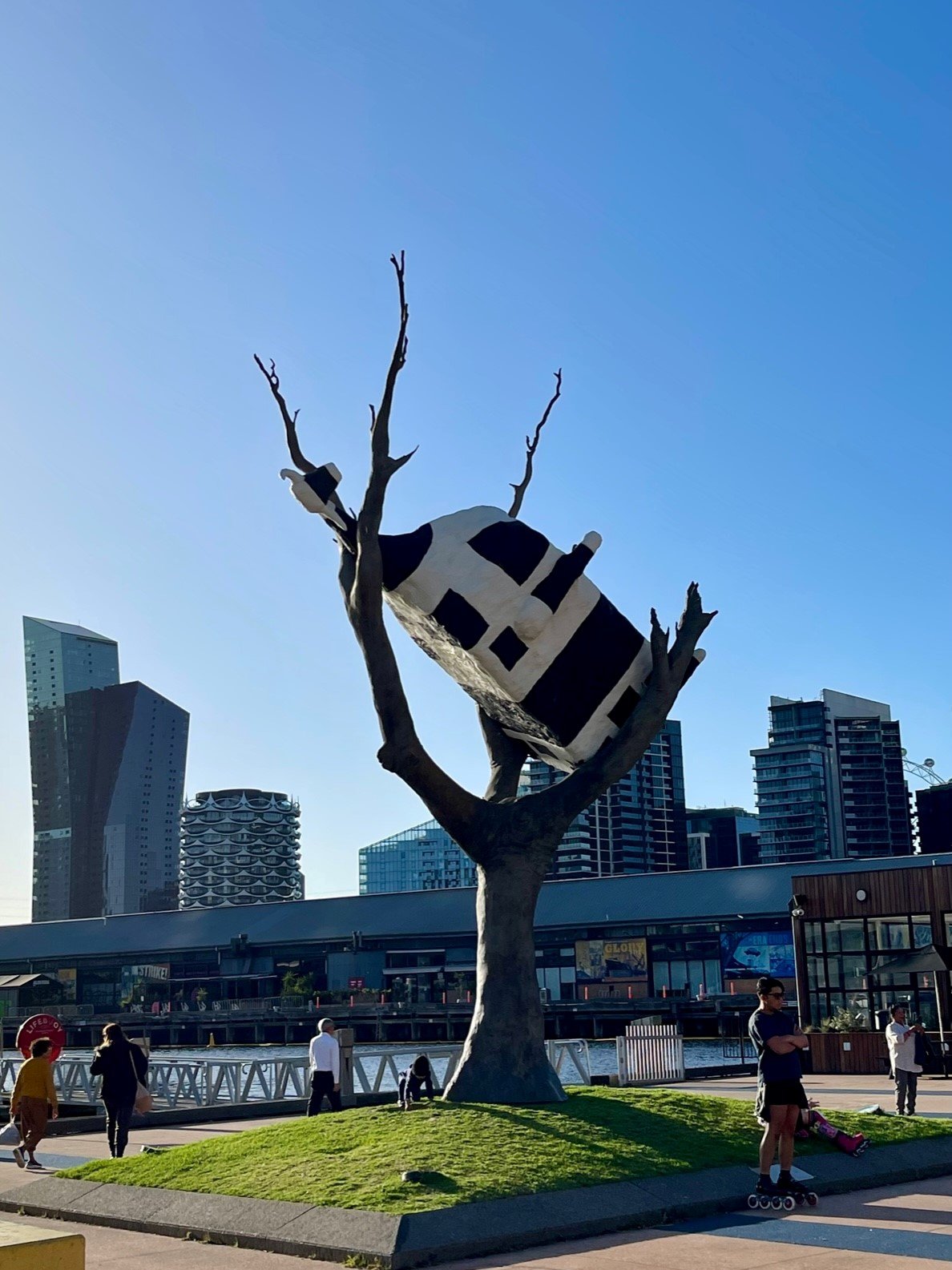
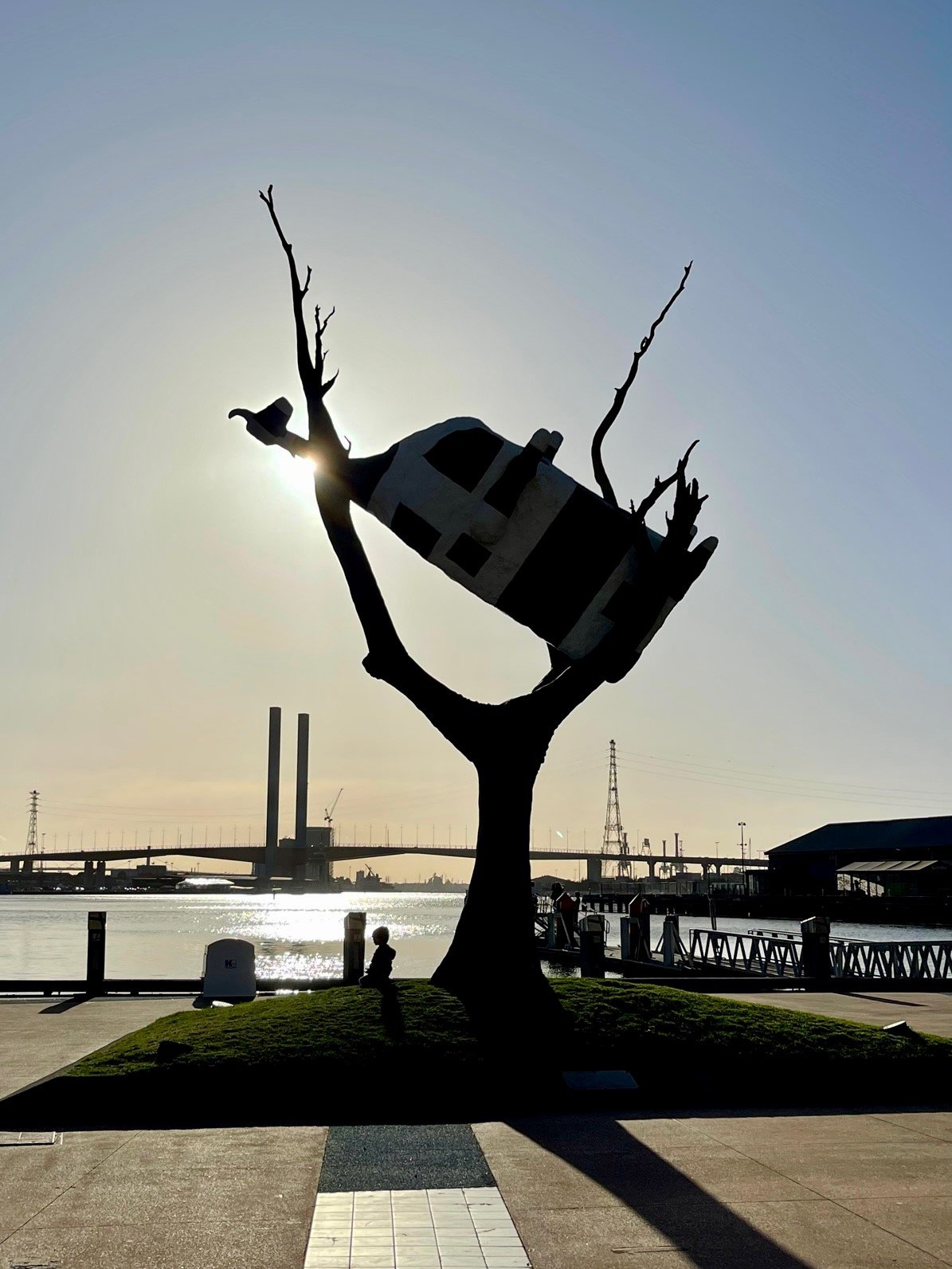
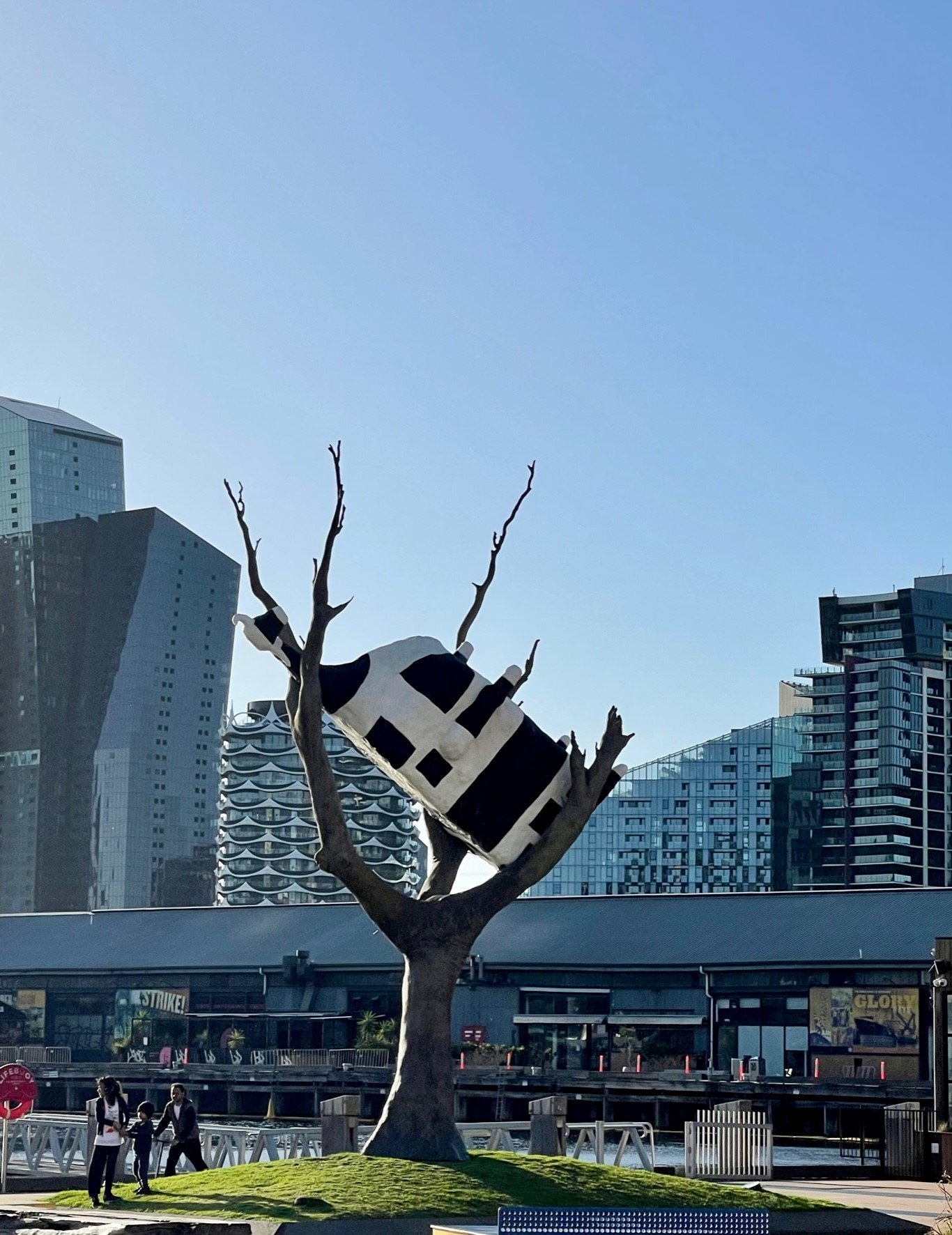
In celebration of Australia Day yesterday, we thought we’d share one of our favorite installations in one of our favorite cities. “Cow Up a Tree” is the aptly-named bronze sculpture by Australian artist John Kelly on the shore of Melbourne’s dockland precinct that depicts a cow helplessly stuck in the branches of a gum tree. Displaying his quirky Aussie humour and bringing an inside joke in Australian history to life, Kelly’s sculpture is an homage to helpless victims of flood waters and Australian artist Sir William Dobell, who when tasked with camouflaging airfields during World War II, filled them with paper mâché cows in hope of fooling Japanese pilots.
Koalas of NYC
Approximately 15.6 million acres of bush, forest, and parks across Australia have burned in the horrific bush fires, according to the BBC. These fires have killed twenty-eight people so far, burned thousands of homes, and have had a devastating effect on an estimated billion animals, insects, birds, and other wildlife throughout the country, including Australia’s koala population. In response, Koalas of NYC, an initiative by the NYC-branch of the Australian agency Cummins&Partners, has launched a fundraising campaign to support WIRES (Wildlife Information Rescue and Education Service), the largest wildlife rescue and rehabilitation charity in Australia. To get the word out about their fundraising efforts, the agency has placed stuffed koalas in prominent locations around New York City, including Union Square, Rockefeller Center, Times Square, and Central Park, and the stuffed koalas have also visited FDNY Engine 7, Ladder 1, Battalion 1 to thank the FDNY for their support in sending firefighters to Australia. A tag with a QR code is attached to the koalas that directs passersby to the Koalas of NYC Gofundme page. The Instagram account, @koalasofnyc, shares photographs of the koalas around the city. We found one outside the Oculus in downtown Manhattan and fell in love. Rachel Mitrani, New York native and creative member of the Cummins&Partners team, tells Untapped Cities: “I’ve loved seeing the reactions to our koalas. This activation reminds people of the kindness and humanity that still exists in the world. How a team, a city, a world can come together in times of crisis and shed a little light.”
US State Department Significantly Increases Reciprocity Fees for Australian Nationals in Certain Visa Categories
Effective December 23, 2019, the Department of State (DOS) adjusted the reciprocity schedule for Australia for certain nonimmigrant visa categories. This change in the reciprocity schedule is a result of Executive Order 13780 (“Protecting the Nation from Foreign Terrorist Entry into the United States”), signed by President Trump in March 2017, that required the DOS to undertake a worldwide review of nonimmigrant visa reciprocity agreements and arrangements to ensure that US nationals receive “reciprocal treatment in terms of validities and fees as that afforded to host country nationals, as required by US law.”
Read moreBetween Two Worlds
Escher X nendo | Between Two Worlds is a visually stunning exhibition at the National Gallery of Victoria (known as NGV) in Melbourne featuring over 150 preparatory sketches, drawings, woodcuts, mezzotints, and lithographs of famed Dutch artist M. C. Escher along with work by the internationally-acclaimed Japanese design studio nendo. The pairing is appropriate since both Escher and Oki Sato, nendo’s founder and principal designer, “share common interests in their love of spatial manipulation, optical illusions and playful visual devices.” In this exhibit, which I thoroughly enjoyed, Sato and his design house nendo have created an immersive installation where visitors can experience Escher’s brilliant 2D graphic world along with nendo’s inventive 3D design world. Sato chose the house shape as a motif for the exhibition because he wanted to create “a house for Escher.” The house motif is repeated in various formats in the exhibition rooms and playfully interspersed with Escher’s own works. In the exhibition’s largest room (the above photo), a grid of black-and-white houses with both open and closed roofs act as a maze that forces visitors to walk through the space to discover tabletop light-boxes displaying works by Escher. Sato says: "I sort of feel like I became best friends with Escher, even though I never met him.” Visitors to the exhibit might feel the same. Escher X nendo is on display at the NGV International through April 7, 2019.
TIME: “US and Australia Might Be Close to a Deal on Refugee Swap”
The United States and Australia are arranging a deal to “swap” refugees from each country’s extraterritorial refugee centers. Australia has approximately 1,800 asylum seekers in camps on the islands of Nauru and Papua New Guinea, many of whom have fled conflict or extreme economic poverty from countries including Pakistan, Iraq, Iran, Sri Lanka, and Afghanistan. Critics have labeled these camps Australia’s “Guantanamo Bay,” and alleged that refugees have been mistreated in the camps. Australia announced at President Barack Obama’s global migration summit that it would exchange their own migrants for those in US-backed detention camps in Costa Rica.
The resettlement process will be administered with the United Nations refugee agency UNHCR, and US authorities will conduct their own assessment and review of refugees along with security checks. The need to resettle these refugees has become a priority for the Australian government because of Papua New Guinea’s order to close the Australian-run detention center and ruling stating that the refugees were held there illegally. Australia has a strict policy to never settle asylum seekers who arrive by sea, in order to deter human smugglers bringing over refugees to Australia by boat, typically from Indonesian ports. The refugee exchange with the US will be a way around this law, and will allow the government to deal with the refugees at these detention centers and potentially close them.
Australian Prime Minister Malcolm Turnbull says that the responsibility to “stop the boats” has fallen to his government, and that this refugee swap wouldn’t be repeated or extended to asylum seekers not already in camps, although the Australian government has previously arranged with other foreign governments to accept asylum seekers. “Our priority is the resettlement of women, children and families. This will be an orderly process [and] it will not be rushed,” Turnbull says in the Wall Street Journal.
UN Special Rapporteur on the Human Rights of Migrants Francois Crepeau, who says that refugees at the detention centers on Nauru have experienced cruel, inhuman, and degrading treatment or punishment, welcomes the refugee exchange with the US. “We don’t know how it’s going to develop, but I certainly hope that it develops in a way that offers refugees and asylum seekers solutions, and if it succeeds at emptying Manus and Nauru, I think this will be a great achievement,” Crepeau tells reporters in Canberra, Australia.
The refugee agreement could potentially be opposed by President-elect Donald Trump, who during his campaign called for tighter immigration controls and spoke of banning Muslims from immigrating to the US. Mark Krikorian, executive director of the anti-immigration Center for Immigration Studies, predicts a "firestorm" of opposition from anti-immigration activists regarding the refugee exchange. "It's so difficult to justify," he tells Fairfax Media. "I don't expect any Republicans will defend it. I can't see a lot of Democrats defending it either. My sense is that when the word gets out on this, it'll be dead on arrival." Other governmental figures are more optimistic the deal will go through. Senior Australian government minister Christopher Pyne believes the deal can be finalized during Obama’s term. "There certainly is time—two and a half months is plenty of time—and if that's the case, it will be a great achievement for the Turnbull government," Pyne tells Nine Network television.
Regarding the pending deal, Amnesty International says in a statement that it is concerned about the lack of information provided by the Australian government around the timeline of the deal as the exact numbers of people who will be given the opportunity to settle in the US.




